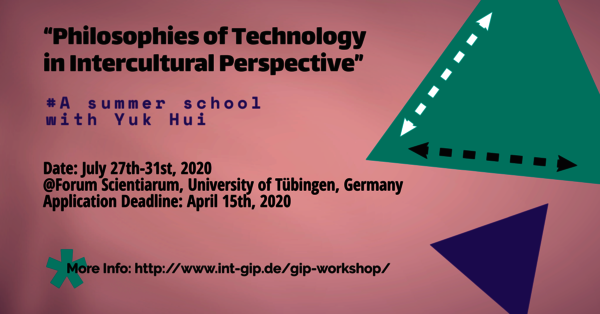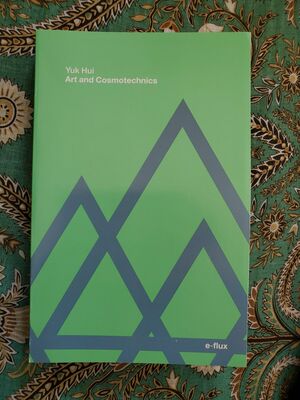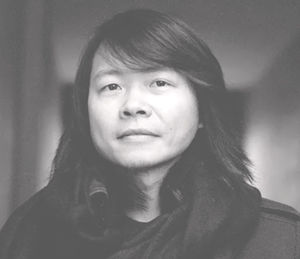
“Philosophies of Technology in Intercultural Perspective” A summer school beyond disciplinary boundaries with Yuk Hui
The international summer school on Philosophies of Technologies in Intercultural Perspective at the University of Tübingen, organized by the University of Tübingen in collaboration with the Society for Intercultural Philosophy as such could not take place due to the current travel restrictions.
Instead, we had a discussion session with Prof. Yuk Hui's most recent book "Art and Cosmotechnics".
We had the participation of young researchers of Asia, Africa, South America en Europe that had the opportunity to discuss wit Prof. Hui's his most recent reflections on the notion of "organicism".

More about the book:
https://www.e-flux.com/books/327526/art-and-cosmotechnics/
Date: July 31th, 2021
Venue: Forum Scientiarum, University of Tübingen, Germany (Online)
Organization: Dr. Niels Weidtmann and Fernando Wirtz, University of Tübingen, Germany
Topic
“Philosophies of Technology in Intercultural Perspective”
In Western philosophy, technology is understood in such a way that humans make use of the laws of nature for creating cultural artefacts, i.e. that humans copy the functionality of nature. In this way, humans have gained a set of instruments that enables them to decouple their cultural development from biological evolution. At the same time, this has led to an instrumental understanding of nature that has recently come under increasing criticism.
There has been a trend within different disciplines like anthropology, ethnology and archeology that acknowledges this point and seeks to rehabilitate non-Western cosmologies. Authors worth mentioning here are Bernard Stiegler, Philippe Descola, Bruno Latour, Donna Haraway and Eduardo Batalha Viveiros de Castro. One author who particularly works in this direction is Yuk Hui. In his book The Question Concerning Technology in China (2017), he proposes to break with the functional Western concept of technology using the idea of ‘cosmotechnics’, which he preliminary outlines as “the unification between the cosmic order and the moral order through technical activities” (2017, 19). Is it possible to think of a notion of technology able to overcome the discontinuities between nature and culture? Departing from the aforementioned definition, Hui points out that in Chinese philosophy (at least until the 19th century), the notion of a ‘technical object’ (qi, 器) is always subordinate to the cosmological and moral order of Dao (道). In this way Chinese thought understands nature as being primarily moral. By carefully reconstructing Chinese sources and its different schools Hui is able to deliver an alternative genealogy of technology and, in doing so, an alternative concept for it.
Far from arguing in favour of cultural particularism, this strategy rather encourages further research about the discursive practices through which problems regarding technology become manifest. In this sense, as Hui writes, “cosmotechnics proposes that we reapproach the question of modernity by reinventing the self and technology at the same time, giving priority to the moral and the ethical” (2017, 290). This should not mean that there are no cosmotechnics in the West at all. On the contrary, what this concept implies is that the Western understanding of technologyshould be seized as one of multiple cosmotechnics and that we should rehabilitate the moral dimension of ontology. Therefore, Hui’s goal does not consist in returning to ancient and more authentic forms of mediation, but to destigmatize the role of cultural pluralism within philosophical debates. His focus on technology seems to provide fruitful ground for an intercultural dialogue.

Yuk Hui is associate professor of philosophy of technology and media at the School of Creative Media, City University of Hong Kong. Previous to that, he taught at the Bauhaus University in Weimar and at the institute of philosophy of the Leuphana University Lüneburg where he also wrote his habilitation thesis. Since 2015 he has been a visiting professor of philosophy and technology (with qualification of PhD supervision) at the China Academy of Art in Hangzhou, where he co-teaches a master class with Bernard Stiegler every year. He is initiator of the Research Network for Philosophy and Technology, an international network which facilitates researches and collaborations on philosophy and technology; and jury member of the Berggruen Prize for Philosophy and Culture. Hui is author of On the Existence of Digital Objects (2016), The Question Concerning Technology in China. An Essay in Cosmotechnics (Urbanomic, 2017), and Recursivity and Contingency (2019), and forthcoming Art and Cosmotechnics.